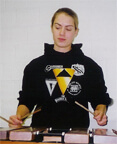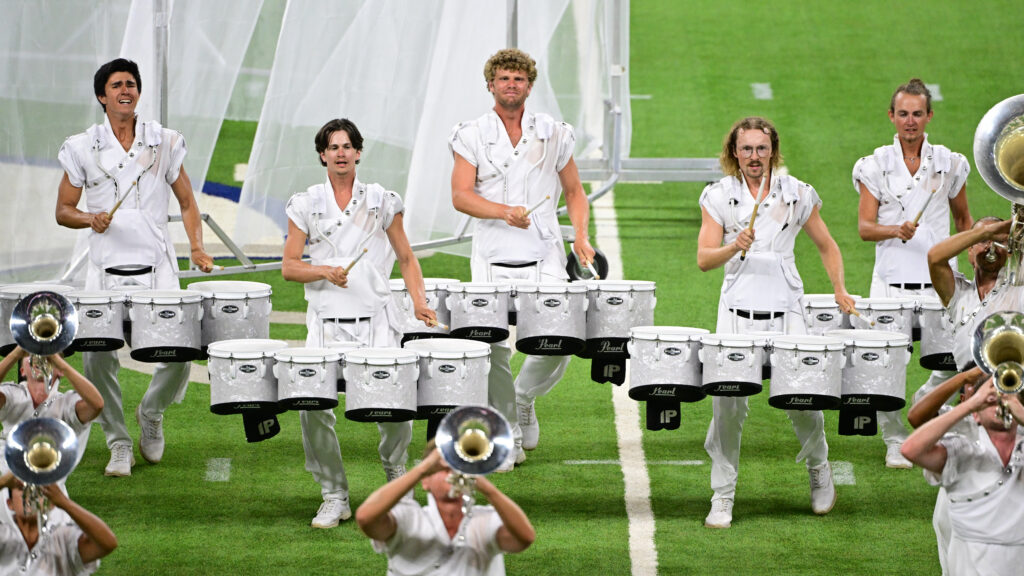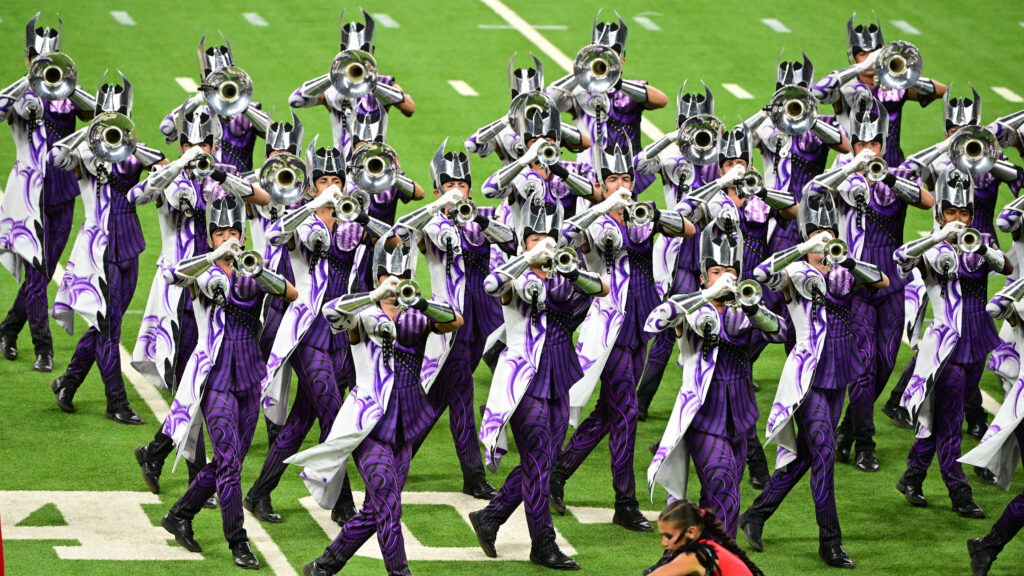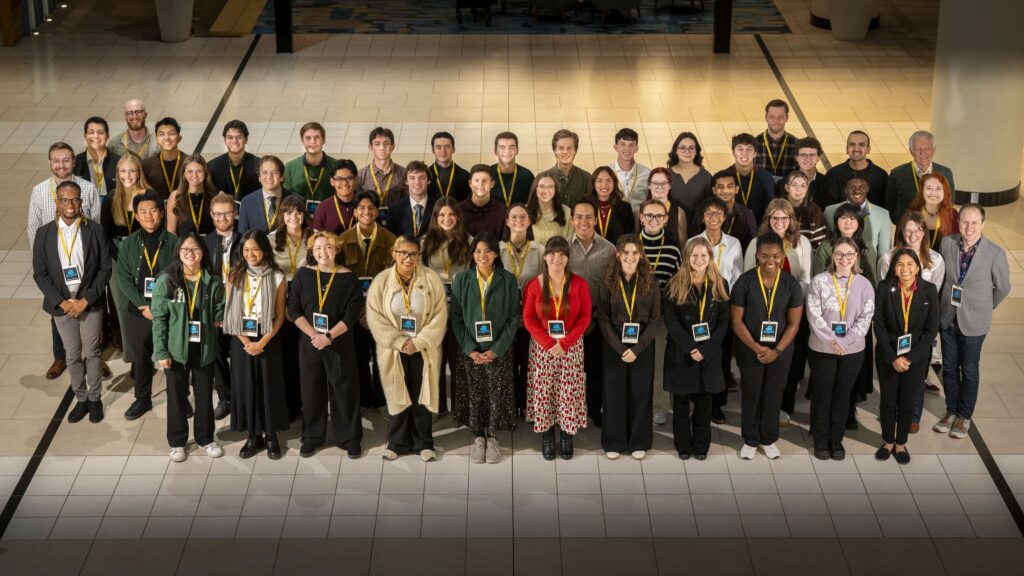This article appeared in the fall 2003 issue of DCI Today
I remember the first time I realized I was aging out.

Of course I knew on an intellectual level when it was going to happen; every person knows from the moment they set foot at an audition camp exactly how much time they have left. No, I’m talking instead about that irreversible knowledge deep in your soul, the feeling of truth that can’t be denied.
I remember the first time I realized, on an emotional level, that I was aging out.
It was the Toledo Zoo performance with the Toledo Symphony Orchestra. It was a muggy, overcast night, and all of us dripped with condensation inside our uniforms. We ran through the show for a very appreciative audience, and closed our performance with the corps song. As I sang, I listened — I mean really listened — to the words and the many voices echoing them beside me and behind me and all around me. I didn’t even make it through the second verse before I had to fight back the tears.
That was in mid-July. By the time August rolled around, I thought I had a handle on it. I thought I’d faced the emotions and accepted the inevitability of aging out. What I wasn’t prepared for was my career to end one show sooner than I’d expected, and that sudden jolt threw all my carefully constructed emotional blockades out the window. Suddenly I had one less day, one less show, one less time to put on the uniform, one less chance to perform.
As much as I disliked dealing with the truck, I would have given anything to need to unload it one more time. And so when it came time to prepare for the age-out ceremony, I put on my uniform perhaps a little earlier than I needed to and walked over to the stadium maybe a little sooner than was required. I wanted to savor every last second of being a member. My corps director had to herd me off the field at the end of the ceremony; again fighting back the tears, I turned at the exit gate and took one last look at the last field I performed on. It was just a football field, a little muddy and abused after a long day and week of hard use. The stadium was just a stadium, not even the largest I’d ever played in. But for me, it will always be special. As I turned and walked out, I tried my best not to look back.
It took me at least an hour to take my uniform off. I made some lame excuse for staying in halves once I got on the bus, and untied my MTXs with extreme reluctance once we got back to the housing site. Something about putting on the uniform makes being in corps very real, far more real than even playing the music and marching the show, and taking the uniform off is the very definite sign that your career as a drum corps performer is over.
I wish I could explain why aging out is such an emotional thing. I think it’s hard to understand until you do it, even if you’re someone who’s close to the activity and understands the love and dedication that goes into being a member. I know I had no clue. I always said I was going to bawl — and I’m not much of a crier — after my last show, and I wondered what life after drum corps would be like. “What do you do when you don’t march?” I asked my age-out friends. “When I figure it out I’ll let you know,” was invariably the answer. Now I find I don’t have a better answer myself.
You see, marching corps is the realization of a dream for most of us. All of us have stories about the first time we saw a corps tape, or the first show we attended, or the first camp we ever went to, or the first (and sometimes second and third) times we got cut, and how hard we worked in the off season to make sure it wouldn’t happen next year.
All of us know high school and even middle school kids who idolize drum corps and the people who do it, who do nothing but watch tapes and learn licks, and who are champing at the bit for their turn. They dream, as we all once did, of becoming a member, putting on the uniform and playing the show for thousands of screaming fans — of making the dream a reality. Those of us who march get to live our dream. Those of us who have aged out don’t get to any more.
I found out on finals night what it means to be an age-out. I sat in the stands, in one of the best seats in the house, and watched as one of my best friends became a world champion. Every bone in my body screamed at the wrongness of it all, that I should be sitting in the stands at a drum corps show; the impulse, of course, was to be out on the field. But that was no longer my privilege, and I fought back the tears.
I found out again about two weeks after tour what it means to be an age-out. I had not watched, had not even touched, drum corps since I got back home. One beastly hot day, during band class at the high school where I teach, the director cut rehearsal short and took the kids inside. He put in the Cavaliers show from 2002 to show the kids what one of the drill moves he’d “borrowed” should look like. Watching a corps show for the first time since finals night, I was reminded again that my time as a performer as done, and I fought back the tears.
By the time my semifinals performance DVD arrived at home, I had reconciled myself with aging out a bit more. Still, I watched the DVD twice through immediately, straining my eyes and ears looking for myself, listening for my parts, searching for some proof that I had actually been there and done that. You see, if marching drum corps is a dream come true — the dream that has become reality — for us old people, the reality is now only memories.
It’s easier now for me to talk about aging out. I’ve tried for a month now to sit down and write this last column, to try to communicate what it means to me for the dream to have passed into memory, and it’s only recently that I’ve found the words to express myself. Meanwhile I’ve distracted myself by passing on what I learned and inspiring others to follow in my footsteps.
That’s my task now. Each person in the drum corps world has a role to play: As a fan, to support the activity; as a volunteer or administrator, to get the corps down the road; as a member, to entertain, awe, inspire, and convert new and old fans alike; and as an age-out, to pass along the wisdom and gifts we received as members.
I work with a wonderful group of teen-agers, and I encourage each of them to try out and to march drum corps. But I know the vast majority lack the opportunity and resources to have a drum corps experience the way I did, and so I try also to teach those lessons of determination, perseverance, teamwork and personal responsibility that I learned in corps. It’s the least I can do to repay those who gave me the gift of having the resources and opportunities to have my own drum corps experience.
And now that my time has ended, it is time for me to let new voices speak about their experiences in drum corps. So while I’ll always be around the activity, as staff, administrator, volunteer, or just plain fan, this is the last time you’ll hear from me in this forum. I have very much appreciated the opportunity to speak to fellow drum corps enthusiasts from around the globe, and even more so to hear from them their stories. It’s nice to know that the experience is universal, regardless of when or where we marched. It’s also nice to know that whatever else may happen in our lives, we are not ever alone; we always have the drum corps family.
I saw part of my drum corps family at a recent weekend, at the Glassmen banquet. We circled up at the end of the awards ceremony and sang the corps song for the last time for the 2003 season. This time I did not fight back the tears and they ran down my face as I was surrounded one last time with the voices of my corpsmates. I had told them, in my age-out speech at the end of the season, that they should cherish the time they have and the people around them, because once each season ends, it’s never, ever the same again; you could get the exact same people together and try to play the exact same notes, but it never truly is the same. And as I stood in the circle, tears running down my face, I knew that no matter how many times I heard and sang the corps song, it would never be the same again. Perhaps that’s what it means, at least for me, to age out.
For all of you who have not yet experienced this transition, I repeat the advice I gave my corps: Cherish the time you have, and most especially, cherish the people around you. They are what make the corps experience so very special. Appreciate the opportunity to march; if there was one thing I would change for myself, I wish I had spent more time enjoying and less time doubting myself and my abilities. Love what you do and do it to the best of your abilities, and you will be successful, in life as well as in drum corps.
For those of you for whom the dream is not yet a reality: Go for it! You never know what can happen until you take that first step. And if you need help, or advice, or a little inspiration — seek out me or any of the other innumerable age-outs. We’d love to pass on a little of what we learned, and help the next generation of members fulfill their dreams.
As for me … well, I guess I’ll have to start my own support group: Drum Corps Addicts Anonymous. Yeah, I’ll be there every night. If you care to join, you know where to find me.
My thanks to everyone who has made this opportunity possible. You may never know how much drum corps has changed my life, but know that I appreciate it more than words can say.





